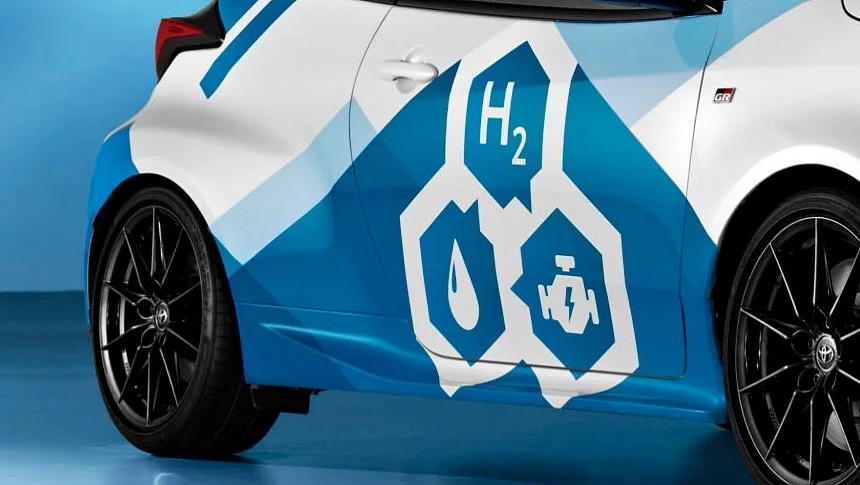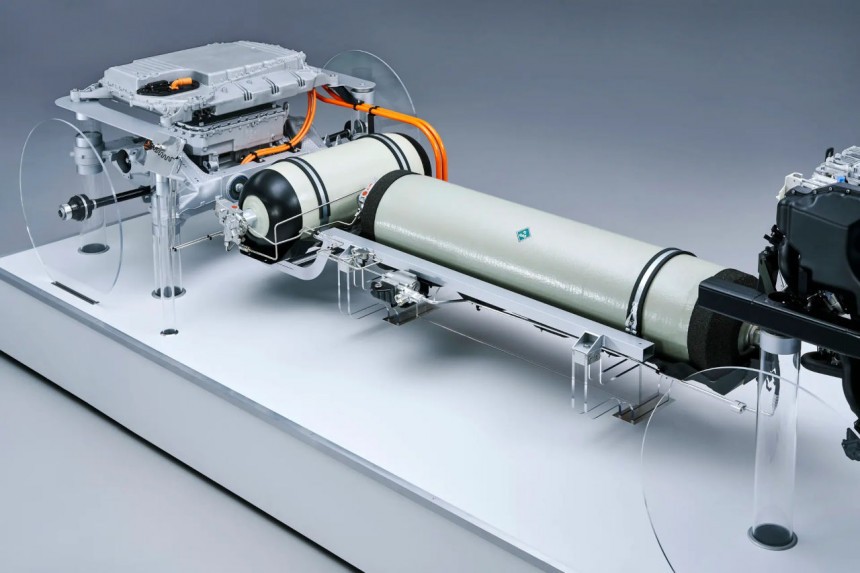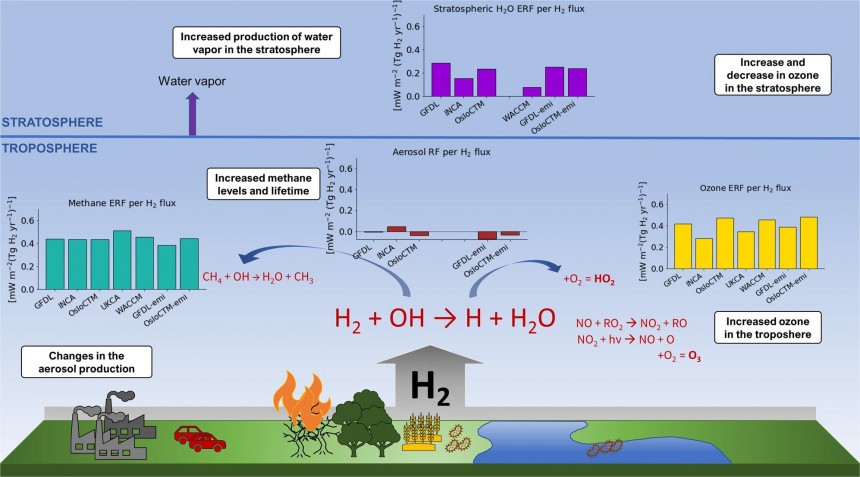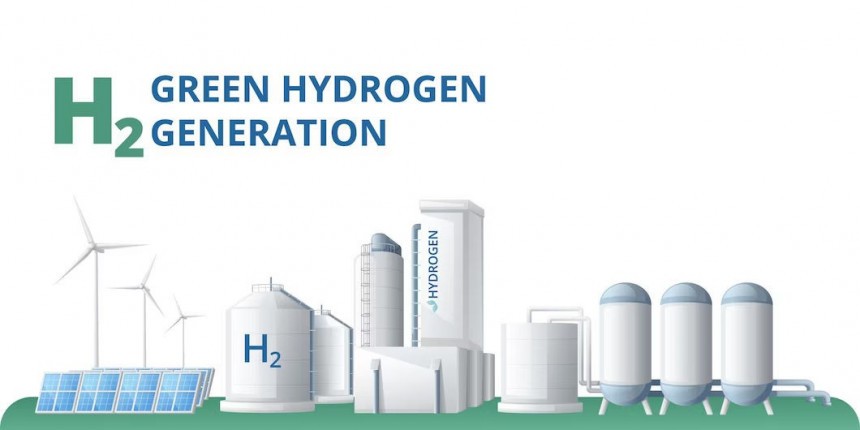Global warming and climate change are already our almost everyday reality. There is no denial about that, except for conspiracy theorists who still mindlessly believe in the "climate change is a hoax" nonsense. Ordinary people like you and me can easily understand that burning fossil fuels and releasing vast amounts of CO2 into the atmosphere is a part of the problem.
But I suspect that regular people, like you and me, will have a hard time accepting that the greenest and the cleanest gas of them all could have a "dark side." Yes, ladies and gentlemen, a group of Norwegian scientists concluded that hydrogen has some global warming effect. And no, it's not a hoax.
That's why Toyota, BMW, Hyundai, and others chose to invest heavily in hydrogen cars when Tesla was on the rise with the battery-electric cars technology. A decade later, hydrogen fuel cell technology and hydrogen internal combustion engines are still in their infancy and relatively far from a feasible alternative to conventional cars. Meanwhile, everybody is betting big on batteries, despite many voices criticizing their downsides.
The funny thing, it all comes down to chemistry, no matter what solution you choose. But most of all, you should pay attention to details because this study is not about BURNING hydrogen. It's about LEAKING hydrogen, which is a whole other story than using H2 to propel cars, trains, vessels, or aircraft. It's a very similar problem to methane leaks – rapidly becoming a severe problem in the oil industry.
They start by stating the obvious: "Hydrogen is not directly a greenhouse gas." I think it's important to acknowledge that because I suspect many titles, social media posts, and videos on this subject might be misleading if they refer solely to hydrogen as a combustible used to create electricity by burning. In fact, the problem is the way we produce, transport, and store hydrogen. Because this is a gas with very tiny molecules, they easily leak into the atmosphere. Unfortunately, the industry is not yet advanced enough to provide H2 leakproof technology for producing and transporting it. But such studies can accelerate innovation in this field.
Scientists emphasize hydrogen's chemical reactions with methane, ozone, aerosols, and water vapor in the stratosphere. At this point, things become tricky because chemistry formulas are involved in this study. I don't know about you, but I was not too fond of chemistry in school back then. I'll keep it as simple as possible.
The GWP100 is a standard unit of measure for how much a gas impacts global warming in 100 years. Hence, it's a good tool for comparing the global warming impacts of different gases, especially greenhouse gases. EPA states that the GWP100 of CO2 is one because it is used as the reference as it remains in the atmosphere for the longest time, even for thousands of years.
Until now, hydrogen was credited with an average value of 4.3 for GWP100, meaning that over 100 years, 1 kg of H2 emissions have the same global warming effect as 4.3 kg CO2. CICERO used five global atmospheric chemistry 3D models, and the scientists could calculate the perturbations of H2 on other gases. Hydrogen impacts the most the methane, with 44%. Then comes ozone (38%) and water vapors (18%).
Summing up all of these, the final GWP100 is 11.6, which by no means is almost three times higher than previously thought. It's also worth noting that scientists also calculated a short-term GWP20 of 37.3 and a long-term GWP500 of 3.31 (I'm sure you already guessed it means a 20-year period and 500 years, respectively).
But let's get back to our "maleficent" H2. It's time to put things into perspective. Let's go ahead and make some comparisons.
Methane (CH4) has a GWP100 of about 27-30, almost three times more than H2's. But there's more to it. Methane leaking from oil and gas extraction around the globe lasts more than ten years before reacting to other compounds in the atmosphere and "transforming" into other greenhouse gases, notably CO2. According to the CICERO study, hydrogen's average lifespan in the atmosphere is merely 2.4 years, almost five times less than methane.
Then you should know that in the short term, methane is much more dangerous than CO2 at storing heat and thus contributing to global warming. Methane from fossil fuels has an estimated GWP20 of more than 80, more than double the GWP20 of hydrogen. Of course, the study has concluded that hydrogen is slightly increasing methane's global warming effect. But replacing methane leaking sources with H2 leaking will only lead to a decrease in CH4 levels, so a reduction of methane's GWP. I know it's a little bit confusing, but we're in the "what is less bad for us" scenario…
Things get even more interesting when we look at the quantities. According to International Energy Agency, by 2050, hydrogen is expected to account for merely 10% of power generation globally, while natural gas is expected to account for at least 30%. Leaked H2 is estimated to be around 5-10% at that time, while leaked CH4 is at least 25% as we speak. It's a bit like going wild for a tree burning in your yard but ignoring the wildfires in Canada.
Maybe slower than we need, but it seems it's going the right way. And now, thanks to this kind of study, the industry can address the leakage problem by developing detection and monitoring tools and creating leakage-proof solutions for producing, transporting, and storing hydrogen. As for myself, I still have doubts about using hydrogen in cars. But at least I'm done with the fake debate "batteries vs. fuel cell." I'm all into the "batteries & fuel cell against oil & gas" battle.
Burning hydrogen – this is tricky!
Burning H2 doesn't harm the air because the result is only Oxygen (O2) and water vapor (H2O). Which are not pollutants or bad for the environment and human health. On the other hand, burning fossil fuels, like coal or oil-based gasoline, or natural gas, results in CO2, a global warming gas, and all sorts of pollutants, which are bad for the environment and human health.That's why Toyota, BMW, Hyundai, and others chose to invest heavily in hydrogen cars when Tesla was on the rise with the battery-electric cars technology. A decade later, hydrogen fuel cell technology and hydrogen internal combustion engines are still in their infancy and relatively far from a feasible alternative to conventional cars. Meanwhile, everybody is betting big on batteries, despite many voices criticizing their downsides.
Does hydrogen have a Global Warming Potential? Yes, it does!
A group of scientists from the CICERO climate center in Norway conducted the study. By the way, this Center for International Climate Research is proud of "playing an active role" in the IPCC "climate task force" (The Intergovernmental Panel on Climate Change), which – guess what – is responsible for assessing and evaluating the risks of human activity pollution on global warming. So, I tend to trust the conclusions of the Norwegians.They start by stating the obvious: "Hydrogen is not directly a greenhouse gas." I think it's important to acknowledge that because I suspect many titles, social media posts, and videos on this subject might be misleading if they refer solely to hydrogen as a combustible used to create electricity by burning. In fact, the problem is the way we produce, transport, and store hydrogen. Because this is a gas with very tiny molecules, they easily leak into the atmosphere. Unfortunately, the industry is not yet advanced enough to provide H2 leakproof technology for producing and transporting it. But such studies can accelerate innovation in this field.
The GWP100 is a standard unit of measure for how much a gas impacts global warming in 100 years. Hence, it's a good tool for comparing the global warming impacts of different gases, especially greenhouse gases. EPA states that the GWP100 of CO2 is one because it is used as the reference as it remains in the atmosphere for the longest time, even for thousands of years.
Until now, hydrogen was credited with an average value of 4.3 for GWP100, meaning that over 100 years, 1 kg of H2 emissions have the same global warming effect as 4.3 kg CO2. CICERO used five global atmospheric chemistry 3D models, and the scientists could calculate the perturbations of H2 on other gases. Hydrogen impacts the most the methane, with 44%. Then comes ozone (38%) and water vapors (18%).
Summing up all of these, the final GWP100 is 11.6, which by no means is almost three times higher than previously thought. It's also worth noting that scientists also calculated a short-term GWP20 of 37.3 and a long-term GWP500 of 3.31 (I'm sure you already guessed it means a 20-year period and 500 years, respectively).
Why you shouldn't worry (too much)
Stating that hydrogen – leaked hydrogen – has a 12-time more substantial global warming effect than CO2 is alarming. We tend to misunderstand pieces of information without considering the bigger picture. It's the same with "EVs are more polluting than ICEVs because of the batteries!" which actually is a trap to mislead people into thinking that using electric cars is worse than polluting internal combustion engine cars.But let's get back to our "maleficent" H2. It's time to put things into perspective. Let's go ahead and make some comparisons.
Then you should know that in the short term, methane is much more dangerous than CO2 at storing heat and thus contributing to global warming. Methane from fossil fuels has an estimated GWP20 of more than 80, more than double the GWP20 of hydrogen. Of course, the study has concluded that hydrogen is slightly increasing methane's global warming effect. But replacing methane leaking sources with H2 leaking will only lead to a decrease in CH4 levels, so a reduction of methane's GWP. I know it's a little bit confusing, but we're in the "what is less bad for us" scenario…
Things get even more interesting when we look at the quantities. According to International Energy Agency, by 2050, hydrogen is expected to account for merely 10% of power generation globally, while natural gas is expected to account for at least 30%. Leaked H2 is estimated to be around 5-10% at that time, while leaked CH4 is at least 25% as we speak. It's a bit like going wild for a tree burning in your yard but ignoring the wildfires in Canada.










